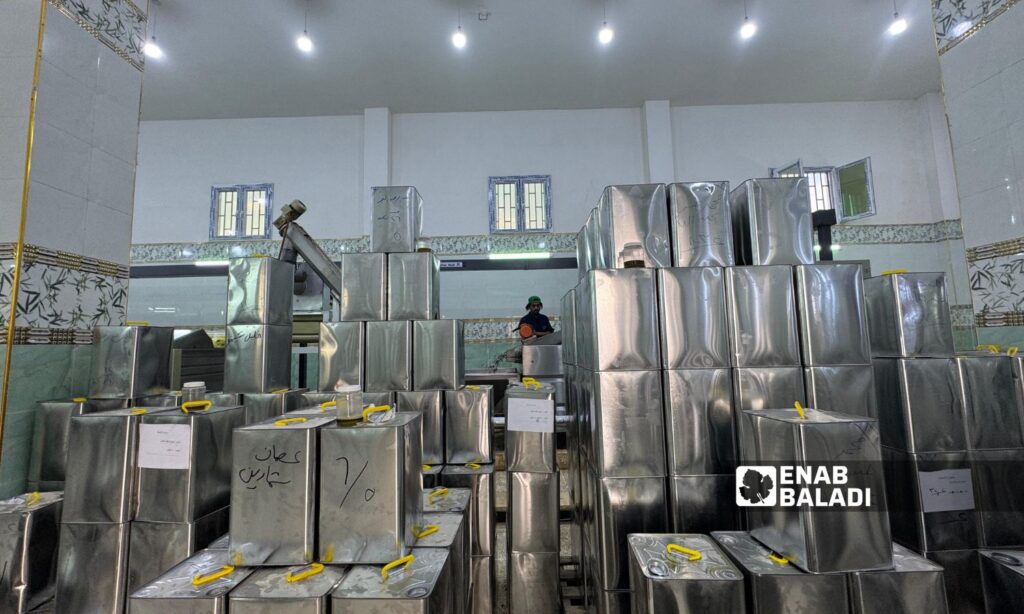Aleppo – Mohammed Ali
The rising prices of olive oil year after year have cast a shadow over the tables of Aleppo residents, as oil is no longer that locally available product at reasonable prices as it used to be; it has turned into a commodity they must be cautious about when consuming.
Syria, which used to occupy advanced positions in olive and olive oil production at the Arab and global levels until 2010, saw its olive oil production fall from about 200,000 tons in 2010 to about 91,000 tons in 2023, with estimates dropping to 55,000 tons in the current year.
As for olive production, it declined from 1,050,000 tons in 2010 to about 712,000 tons in 2023, while the estimates for the current season do not exceed 430,000 tons according to official government figures.
The dream of reaching the crop
Abdullah (58 years old) has been living with his family in Aleppo for decades, originating from one of the villages in southern Idlib, where he still owns a piece of land planted with olive trees. However, he has not been able to access his land and crop since 2012 due to the conditions of war and the dangers of moving between the areas under control of the opposition and the regime.
Over the past years, Abdullah managed to agree with his relatives who are in the village to take care of his agricultural land in exchange for a share of the olive and oil crop, provided that they send him his share of oil annually through shipping companies.
Shipping difficulties and military checkpoints hindered him from receiving his share in 2023, while this year, his relatives succeeded in securing the shipment of four tins of oil that traveled from Idlib to Aleppo.
Abdullah explained that transportation fees amount to 400,000 Syrian pounds (calculated in dollars and equivalent to 27.5 USD) for each tin if the sender pays the fees in Idlib. However, if the recipient in Aleppo wishes to pay the fees, the company charges the same amount in Syrian pounds, noting that the fees have skyrocketed, as they did not exceed 90,000 pounds per tin just two years ago.
Abdullah stated that the transportation situation has improved this season, adding that the shipment used to take several weeks to travel from Idlib to Aleppo, while the waiting period this year was no more than three days.
Price disparities
The price of a tin of oil in Idlib ranges between 700,000 and 950,000 pounds (48 to 65 USD) depending on quality, along with transportation fees, which brings the price to a maximum of 1.6 million Syrian pounds (110 USD) for the oil coming from Idlib, meaning that the price per tin in Aleppo may be double that in Idlib, noting that the price decreases below that based on the acid percentage in the oil, with the possibility of cheaper prices reaching 1.1 million pounds for lower quality types.
On the other hand, Kurdish oil, especially that coming from Afrin, is more desirable than Idlib oil among most Aleppo residents who have been accustomed to its flavor for many years, but prices vary noticeably from one seller to another.
While the price of an olive oil tin in Afrin ranges between 740,000 and 1 million pounds (50 to 70 USD), the shipping fees to inside Aleppo amount to 450,000 pounds. However, some sellers offer the tin at 1.7 million pounds claiming it is of first-rate quality.
Other sellers offer lower prices reaching below 1.4 million pounds, while coastal oil from Latakia and Tartus is cheaper, with the price of the tin dropping below 1 million pounds but does not enjoy popularity among consumers in Aleppo.
Prices are considered high compared to the living and economic conditions of the residents, with the minimum government salary being 279,000 Syrian pounds (less than 19 USD).
In October, a statistic conducted by the Central Bureau of Statistics in Syria revealed that a significant number of Syrian families have come to rely on just one meal a day due to the decline in living and economic conditions to very low levels.
What’s the story behind the exit from international standards?
Last October, food safety expert Dr. Mohammed al-Shehabi revealed that Syrian olive oil had fallen out of the international quality standards set by the Global Standards and Specifications Authority.
Dr. al-Shehabi stated at a food security conference at the University of Damascus that the Ministry of Agriculture must monitor olive oil from the washing of the fruit to pressing to ensure quality and that the established quality specifications are consistent with global standards, according to what was reported by the official Tishreen newspaper.
However, the director of the Olive Office at the Ministry of Agriculture, Abeer Jawhar, denied that Syrian oil had fallen short of international standards, stating in an interview with the local al-Watan newspaper that the standards studied in the food constitution pertain to the purity of olive oil, not its quality.
Syria ranked fourth globally among olive oil producers from 2004 to 2008, but its ranking dropped to tenth place during 2019. Regime government officials cite sanctions and war as causes for this decline, while the difficulty of farmers securing agricultural supplies and the lack of support are considered the main reasons for the downturn.

